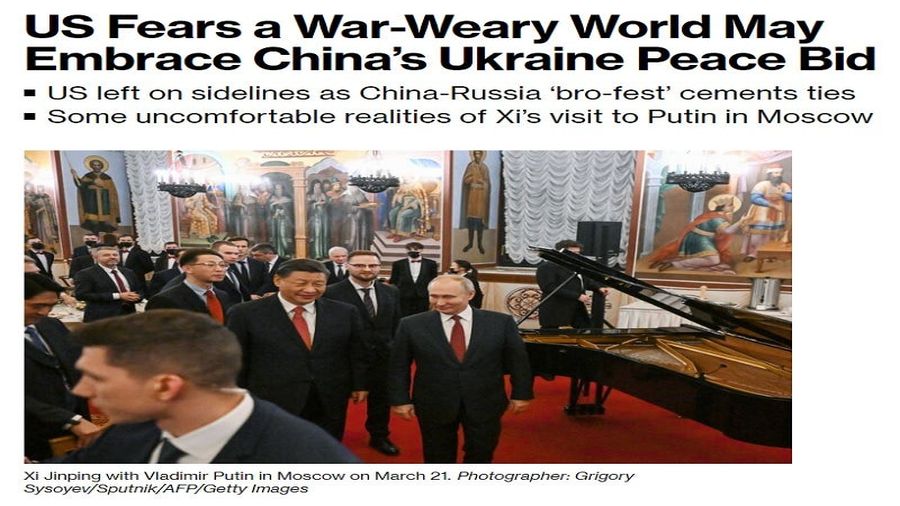The US’ Rejection of China’s Peace Plan for Ukraine Exposes Its Warmongering Intentions
By rejecting Beijing’s 12-step proposal, Washington exposed its warmongering intentions for the rest of the world to see and vindicated Moscow’s criticism that it wants to fight this proxy war “to the last Ukrainian”. The majority of the international community that resides in the Global South and which is most adversely affected by the systemic consequences of this conflict, particularly the food and fuel crises catalyzed by Western sanctions, had their perceptions of US soft power shattered once and for all.
Bloomberg cited an unnamed Biden Administration official on Thursday to report that “the US is worried about being backed into a corner over the Chinese proposal. Regardless of the US reservations, dismissing it outright could let China argue to other nations that are weary of the war — and of the economic damage it’s wreaking — that Washington isn’t interested in peace.” Alas, that’s precisely what America has done by acting as if China isn’t a serious mediator and that its peace plan is unrealistic.
By rejecting Beijing’s 12-step proposal, Washington exposed its warmongering intentions for the rest of the world to see and vindicated Moscow’s criticism that it wants to fight this proxy war “to the last Ukrainian”. The majority of the international community that resides in the Global South and which is most adversely affected by the systemic consequences of this conflict, particularly the food and fuel crises catalyzed by Western sanctions, had their perceptions of US soft power shattered once and for all.
Prior to the onset of Russia’s special operation last year that it was forced to commence in defense of its national security red lines in Ukraine after NATO clandestinely crossed them there, a significant share of folks in developing countries still generally had a favorable view of that declining unipolar hegemon. They might not have endorsed every one of its foreign policy moves, but these people still thought that its worldview had some redeeming factors that made it worthy of being listened to at the very least.
The allure of its soft power, particularly in the socio-cultural sphere as propagated by the mass media over the decades, still had a powerful hold over their hearts and minds. Now, however, these same people are directly suffering from the food and fuel crises catalyzed by the West’s unilateral sanctions. To make matters worse, the US signaled through its rejection of China’s peace plan for Ukraine that relief won’t be forthcoming, thus indefinitely perpetuating and thus exacerbating these problems.
It’s one thing for US-inclined folks in the Global South who’ve fallen under the sway of its soft power to oppose some part of its foreign policy regarding a faraway country and another entirely for that same foreign policy to directly affect them and their family. They might still enjoy consuming some of its socio-cultural products and perhaps still cling to believing in the so-called “American Dream” despite the odds of them ever benefiting from it, but their views of the US as a whole will certainly change.
This rapidly emerging outcome represents a latent crisis of the highest importance for the US’ grand strategic interests since the loss of such a critical mass of supporters will hamstring its goals across the Global South. These same people will be less susceptible to its information warfare products against their multipolar governments, thus reducing the chances that forthcoming Color Revolution plots will succeed, to say nothing of them tuning out the US’ fake news about the Sino-Russo Entente.
The combination of hunger pains and rising costs, which are the direct result of the food and fuel crises respectively that the US’ unilateral sanctions are responsible for, can turn anyone against anything even if they were previously the most fervent of believers. This is especially so when it worsens the living conditions of one’s own family, including their children. The arrogance of American policymakers, deluded by the supremacist belief in their system’s supposed “exceptionalism”, blinds them to this.
The aforesaid oversight, which could easily have been foreseen and thus avoided had groupthink not been in effect, is the proverbial straw that broke the camel’s back and turned the Global South against the US en masse. There’s now no credible possibility of America advancing its interests there by information warfare-driven attraction ever again, thus leading to it doubling down on subversion and force out of desperation instead of accepting the loss of its influence in those countries.







